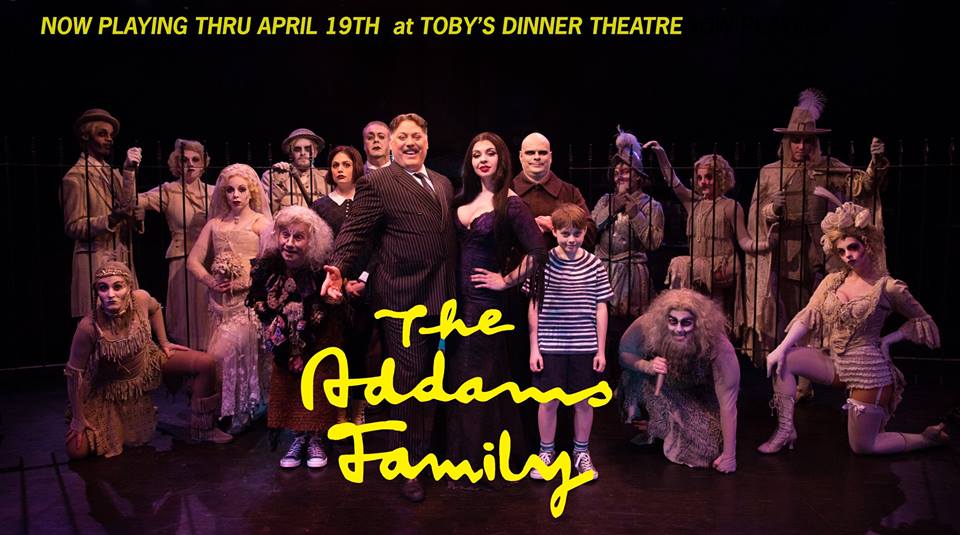Living…dead…and…undecided! Every member of the Addams Family clan is welcome in this creepy and kooky interview series. And Grandma Addams is definitely on the undecided line of the family fence. Why, they aren’t even sure whose mother she is! In Part 3 of the Move Toward the Darkness Interview Series, veteran of the stage David James sits down with TheatreBloom to discuss his role in The Addams Family musical at Toby’s Dinner Theatre.
No stranger to these sorts of interviews, let’s do a reminder to the readers of who you are and what you’ve done in the last year or so.
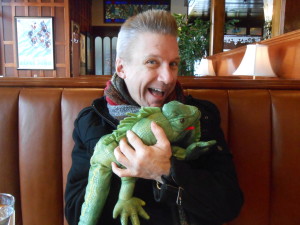
David James: Oh I don’t know chronological order. Let me try. Hold on. I’m Grandma Addams in The Addams Family, that’s now. And before that I did Robertson Aye, Valentine, and multi-purpose ensemble in Mary Poppins, I reprised the Captain of the Guard for Pirates of Penzance over the summer and before that it was the Character Man track— Historian, Not-Dead-Fred, the Frog, the Minstrel, and Prince Herbert— in Spamalot. That should cover me for the year. All of those were at Toby’s. Oh, and I’m David James.
Right! So, what was the appeal to want to come out and audition for The Addams Family?
David: The appeal: never done it before and Mark Minnick (Director Mark Minnick) at the helm. You know going into it that it’s going to be a polished show, which I thoroughly enjoy being a part of.
What was your exposure to The Addams Family as a cultural experience?
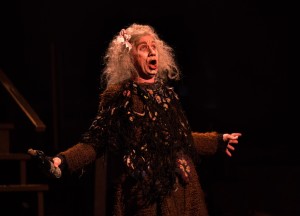
David: Well…as old as I am…I did watch the black and white version on TV as a child. I was aware of that, the half-hour special on Saturday morning or whenever it was that it ran. And of course I watched all the movies as they were produced throughout the 90’s in theatres. And then I did not see the show on Broadway but did catch it on the ‘you of tubes.’
Do you have an Addams family member that was your favorite or that you personally relate to?
David: I think…hmm…I love Morticia because of her hair. I’m kidding. But maybe only a little. I loved the way she was dressed. She was very mysterious to me. Something about here just really intrigued me, she was my mysterious woman. If I were to be straight I would pick her to date.
So that’s a rough segue, but I’ll take it. You’re playing Grandma Addams. How did that come to be?
David: I’ll say it again so everyone is clear. Grandma Addams. We’re not changing it around, I’m playing a woman. Believe it or not this was not my idea. I did not show up and go “Oh that’s the part I want to play.” There was talk of it early on…murmuring about it and then all of the sudden I got the email request to come and audition for the role. So that’s how that all happened. I just went with it.
This is not my first cross-dressing role, you know. I’ve done it many times. I played a step-sister in Cinderella, opposite of Darren (the other step-sister, Darren McDonnell, currently playing Mal Beineke in The Addams Family) and that was oh a few years ago…Christmas of ’11? No, Christmas of ’10. I was also Goldilocks in Tales of Three for Toby’s youth theatre program. And I think my first drag for Toby’s was Miss Willa Jean in Best Little Whorehouse in Texas in the opening scene when they’re introducing the show and Miss Willa Jean is in her wheelchair…I was in full drag regalia for that. And that was an unspeakable amount of years ago.
It’s been a while since I’ve done the drag roles, though we did remount Tales of Three this past year…and I guess before that it was Cinderella. So almost five years ago for a main-stage drag role.
What is it like for you taking on a cross-gender casting assignment, especially in roles that are not traditionally cross-cast? Do you think the audience is going along with this particular cross-casting?
David: Well with anything, you go into the role with a lot of “what if’s?” But you have to trust the direction. And I trust Mark’s direction. He’s one of the main reasons this show works the way it does. Basically, I thought this role would work better than the step-sister role, in regards to cross-gender casting, because Grandma is 102 years old. She’s decrepit and old. As we age, we become more manly anyway. I mean, as women. Older women tend to look, act, sound more like a man as they age, especially in that beyond 90’s range. So I think that’s more believable than a “younger step-sister.” That’s not to say we didn’t make the step-sister characters work. I thoroughly enjoyed working with Darren McDonnell on that show and we cracked the audiences up. I just think that it’s asking a lot less of your audience with grandma to go along with it because she is so old and questionable.
What are some of the challenges of creating a character like this, aside from the obvious?
David: You mean aside from the fact that I’m a male and she’s a female? And that she’s 102 and I’m not? That’s the most difficult part of it, the physicality of it all. It’s not just hunching over, it’s actually being in a squatting position and that wreaks havoc on the lower back, the thighs, and the calves. You’re standing there on stage for a period of time and everything starts to seize up because you’re holding that position. Walking and moving around just gets difficult after a while. It’s not just walking hunched or waddling; you have to focus on the gait of her. It’s maneuvering at that level, that’s what I’ve started calling it. But I don’t get to see it, of course, because I’m doing it so I don’t know how it actually is coming across. It does feel like I might be 102, so I hope it reads that way. Mark is happy with it, and I’m happy with it, so it must be close to 102.
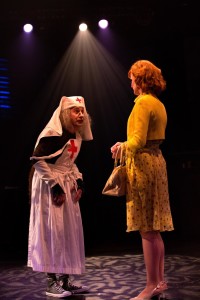
I love that challenge with any character role. I’ve been doing character roles since I was four. With any character role that I do I love to look into it. I ask all the questions. How would that person walk? How would that person talk? So that’s one of the joys of being an actor because you get to really explore all of those things for these different roles and really experience things you wouldn’t otherwise. I’ll never get to be a 102-year-old grandma, but this role lets me feel what that’s like and experience that walk of life.
Creating the voice for Grandma was a little difficult too. The way Mark put it, he wanted it, her— the sound of her— to be reminiscent of someone who has been smoking for quite some time. So there is a guttural aspect to it. That’s difficult for me, though, because I’ve never smoked. Don’t smoke, children, it’s bad for you. But that is where she’s at vocally. And you do have to pitch it just high enough for people to think it’s slightly feminine. It’s not girly high or anything, but enough that it’s not a man’s voice. It really works when we have the moments where I’m speaking with Pugsley in the ‘grandma voice’ because I’m being nice, but then all the sudden I say “And don’t touch my shit, or I’ll rip your leg off and bury it in the back yard.” I take that down into my man voice to scare him. So you get the balance of both of those sounds to really make her a complete character.
That covers the big challenges. Well, no, the makeup too. It’s a 30 minute process. We have to be off the floor 30 minutes before the show starts, and even that’s tight. It’s almost like doing Cats with all the extensive makeup for each character. Grandma has to have her teeth blacked out, and moles glued on. And then there’s all that shading. All of that kind of stuff, I mean it’s a process and it takes a good half hour, but it really does define her as a character. Once I put the wig on I’m like “here’s granny.” That wig goes on and I automatically start hunching over. It makes you who you are.
If you were not playing Grandma Addams, when you took an interest in the show initially because you’d never done it before, what role appealed to you?
David: I actually had no idea, like I said I wasn’t familiar with the musical so I didn’t know who all the characters were going to be? I don’t think I would shave my head, so Fester would not be an option for me. I’m not a Gomez and I’m not a Lucas…
You mean Mal?
David: Or Lucas…so probably a dead ancestor. I think that’s my answer. I would have been a dancing dead pilgrim or conquistador or whatever the other dead ancestor options are. I mean across the board, all the characters are so well defined because of the TV show in the late 50’s and 60’s there is a definite look that needs to happen with each one of them. That’s one of the great things about this show— every member of the Addams Family, whether they are the main group or the ancestors, is an individual. So I would have loved being an ancestor too. I think the ancestors get to do more dancing than I do, and I love dancing. But I’m very happy being Grandma, it pushes me to really challenge that explorative actor side of myself.
I know you said you had not officially seen the Broadway version, but there were major overhauls and edits from Broadway to the version of the show that’s available now…including a lot of cuts in numbers where Grandma previously sang. What are you doing to make Grandma stand out as an important member of the family?
David: Being present in every moment. I think that is the hardest thing for any actor to do, especially when you don’t have anything to say. Like with Lurch’s character and my character, we have our moments where we do speaks— and Lurch doesn’t even really get that— but for the most part we’re silent. So it becomes about remaining in the moment and active in the scene without hopefully stealing focus.
Do you have a moment in the show that defines the show for you?
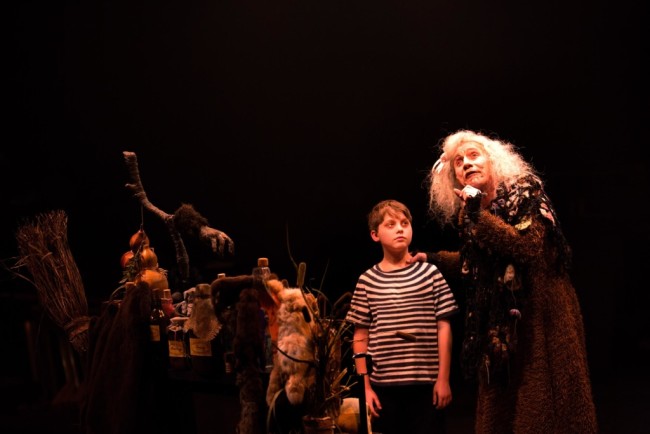
David: I love the moment I have with Pugsley where I start explaining how you need to take time with your life and figure out who and what you are. I think that shows Grandma’s softer side, but just for a moment because then she has that quick dark come-back with “leave my stuff alone.” So I think that scene really brings up an important message. It’s also the longest scene Grandma is in where she gets consecutive lines. You get a chance to look at her right there and see what she’s really all about. She’s living in this household but what do you really know about her? She’s a mother— we don’t know whose, but she is somebody’s—, so in that scene you see her taking Pugsley under her wing in that maternal fashion.
You and I talk about that all the time, making the most out of every moment. That must register for you personally, how are you connecting that to this character?
David: It’s true. We all make that choice to be in a show. Whether it be a small part or a large part, if you a truly dedicated to the craft then you’ve got to make each of those moments on stage mean something, otherwise why are you out there? And that’s true of life. We only get a certain time as far as living goes, and if you’re not out there making the most of it, what are you doing? I take that onto the stage with me. I’m dedicated to the craft, and every moment, whether I’m a lead, whether I’m a feature or cameo, whether I’m ensemble— every moment is lived in and made the most of because I love what I do and I’m committed to it 100%. I hope that didn’t sound full of myself.
Not at all. You are consistently my example of people who wholeheartedly commit to a part, regardless the size or significance of the role. You have a dedicated commitment, regardless of the role, that all performers should strive to have.
David: Thank you. Honestly, thank you. I look at it as there’s a reason why each one of those characters is in the show. Every character in the show has a specific place because they serve a purpose. Without you making the most out of your moment on stage and filling your purpose, the whole show cohesively is not going to work, in my opinion. You can tell in an ensemble heavy piece like this, if one person is not on point with what they’re doing? You can feel that in waves all across the show.
Fortunately with Mark at the helm, he’s so thorough, you won’t find that in any show he directs. I think he always makes it very obvious— and he uses this signal that “everything is right back here.” And I’m pointing to the back of my head when I quote him on that. He remembers, he acknowledges, he takes not of the fact that you are either committed or not committed to a role. And I believe that will either cost you a job or get you a job down the road with him. Especially if he’s asked you to change something and you choose not to. Mark is an exceptional director who knows what he needs from people to make a show really work and he gets it every single time.
Well said. Now, Grandma doesn’t get to do a whole lot of dancing…
David: It’s fine…again, there are moments in the show that she does get to shine like in the opening number where she does ‘the twist’ and she gets a little pelvic action going on. It doesn’t bother me that she’s not a dancing character even though I love dancing. I’ve been doing this for so long that it will come around. I’ll do bigger parts, I’ll do smaller parts. I’ll do dancing parts, I’ll do non-dancing parts. This is a non-dancing part and I don’t mind it at all. I love it. There is a cohesiveness to the show because of what we’re asked to do in all different aspects of it. If you’re doing what you’re asked to do, then the whole thing looks incredible. Grandma doesn’t dance but she has other places to shine and that’s all that matters; she serves her purpose and I hope I’m living up to her serving that purpose.
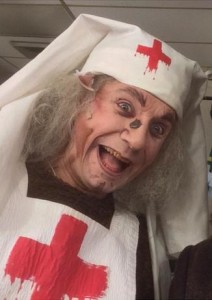
Grandma Addams, even though I sort of said she’s a “silent” character like Lurch, what she contributes to the story is the catalyst for the chaos that moves the story into the second act. Without the Acrimonium there would be no result for Mal and Alice. And them getting resolved is a part of everyone else’s resolve, so Grandma and her remedies kick the show into gear. And then of course Grandma gives Pugsley the opportunity to create the chaos that he loves. So she gives him something to work with too.
You’re the main character who interacts with Pugsley. What has that been like, being the thru-line for how the young kids in this show relate to the show?
David: Children and dogs. And animals. Children and dogs and animals on stage. I love it. How sarcastic did that sound? Wait, you type these out, right? No, seriously. I honestly love the fact that you are seeing children on this stage with a real passion for theatre. When I was their age there was this love of theatre in my heart and you can tell that both of these kids (Jace Franco and Gavin Willard, who play Pugsley Addams) really want to do theatre. You get to see that every night on stage with the way they hear the reactions from the audience, and they get to do a song and feel the response from the audience and you can see that in them when they take their bows. It’s really great to see new and upcoming children who hopefully will become the next generation of dedicated performers to the stage.
The show is very much about family dysfunction. Is there a lot of that going on in your family?
David: Oh my God, yes! Anybody that says that they don’t is a liar. I mean it’s funny because I watch Jerry Springer from time to time and I’ll sit there and say “Oh my God! That family! It’s so messed up!” But then I stop and think about it for a minute, and actually? We’re all in the same boat. We may not have the extreme that they push it to for TV ratings? But it’s all the same. We all have dynamics in our family that dictate who we’re meant to be or who we’re going to be as we get older. You can either choose to go along with it or you can choose to fight it. Family is family. And they hit on that in the show. Family first and family last…I just wish they would give Grandma back her moment to say whose mother she is.
Whose mother do you think she is?
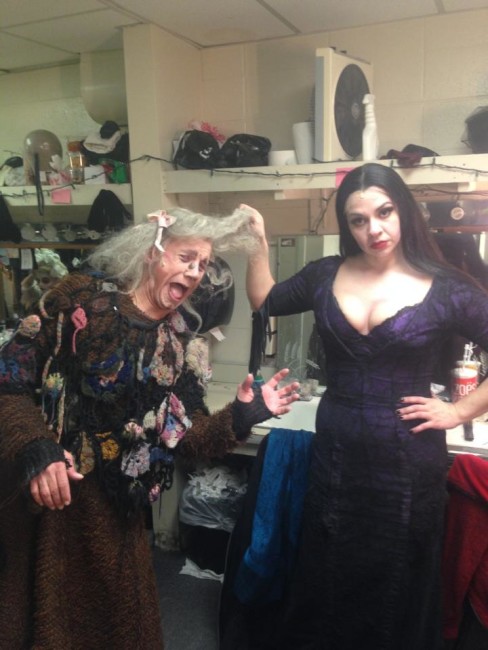
David: I don’t think she belongs there. That’s all I can say. But remember, the Broadway show has that great moment where she comes back in after they make the references to her up in the attic doing marijuana and drugs and whatever, and she says, “I heard you guys talking about whose mother I really am, well I’ll tell you whose mother I really am! I’m—” and then she pauses, sort of like she does during the “Full Disclosure” scene. And she says “I can’t remember, I guess I smoked too much weed.” So they leave it open for the general audience. I love that moment.
There’s a the song at the end, “Move Toward the Darkness” what does that mean to you as a performer?
David: Moving toward the darkness? Hehe. What do you think it means?
To me? I think it’s about embracing your inner faults and flaws. I think that if you can’t take on what you have as far as faults and flaws and whatever, whether they take the form of physical imperfections, emotional shortcomings, your insecurities, your doubts, your fears, if you can’t embrace those things and accept those things as a part of you who you are then you’re a phony.

David: Well put. Now, every single one of those characters in that show, and by proxy each actor that plays them, has their own inner darkness that defines who they are. And who is it, of course, Lurch, he’s the one that says “Ok, guys here’s what we need to do.” Which I find hysterical since he’s the silent character and doesn’t say a word the entire show. I believe, like you, we all have those inner demons inside of us. And that by embracing them, we can lighten up a bit. Let’s not take things so seriously. Life is what you make it; don’t get hung up on the small stuff. It’s true, so true.
Why see The Addams Family at Toby’s?
David: I say this every time I talk with you. Go back and see how closely the wording is from the last two interviews. It’s intimacy. You get to see these characters up and close and personal. Proscenium stage is great for a lot of visual stuff, but at Toby’s you are right there. It’s theatre in the round and you are right there with them so you get to see each one of these characters from all angles, literally, and so close in your face— nothing can compare to that. I love the fact that you’re that close. Unfortunately, it does expose you as a performer to the audience on a level that is incomparable to anything else. They see everything. You don’t get to hide behind a piece of scenery or behind a proscenium. You are right out there in front of them and they see everything. Which goes back to what I was saying about being in the moment, if you’re not in the moment? They see it firsthand.
I think that’s why Toby’s is able to put forth such quality work. There is no cheating or hiding or any of that because everything is exposed right there up close and personal. We’re not hiding anything and we’re staying present because we know eyes are always on us. And like I said with why I wanted to be a part of it, Mark has a great deal to do with that. In a Mark Minnick show every breath is accounted for; every line, every move and the result is amazing work from every single person on that stage. You won’t see a show this polished, this intimate anywhere else.
Alright, let’s close up here with the show favorite. It’s time to play “Full Disclosure!” We need a Full Disclosure from Grandma Addams and from David James.
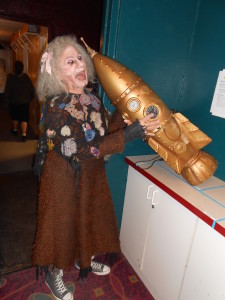
David: Hmm. Well my character already has a full disclosure in the show. What do you want, part two? Okay…with all of her herbs, potions, and remedies, I think she deals on the side. I think she’s a dealer, I really do. I mean would that really be such a bad thing? Hence the line “no prescriptions needed.” So that could be an okay thing, maybe it’s how she earns her keep in the Addams house. Then again marijuana is au natural…my personal full disclosure is that I will be married within the year. We’re tying the knot legally. So that’s my Full Disclosure.
The Addams Family plays through April 19, 2015 at Toby’s the Dinner Theatre of Columbia— 5900 Symphony Woods Road in Columbia, MD. For tickets please call (301) 596-6161 or purchase them online.
To read the TheatreBloom review of The Addams Family, click here.
To read Part 1 of Move Toward the Darkness: Ancestor Addams— Julia Lancione click here.
To read Part 2 of Move Toward the Darkness: Lurch Addams— David Bosley-Reynolds click here.

